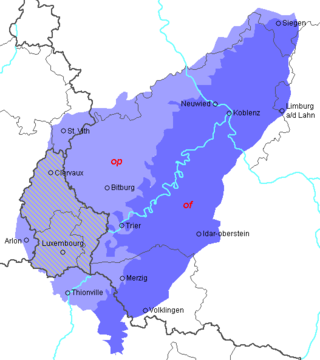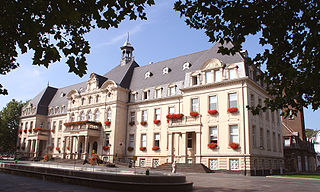
Luxembourg, officially the Grand Duchy of Luxembourg, is a landlocked country in Western Europe. It is bordered by Belgium to the west and north, Germany to the east, and France to the south. Its capital and most populous city, Luxembourg City, is one of the four institutional seats of the European Union and the seat of several EU institutions, notably the Court of Justice of the European Union, the highest judicial authority. Luxembourg's culture, people, and languages are greatly influenced by its much larger neighbors France and Germany; for example, Luxembourgish, a Germanic language, is the only national language of the Luxembourgish people and of the Grand Duchy of Luxembourg, French is the only language for legislation, and all three – Luxembourgish, German and French – are used for administrative matters in the country.

Luxembourgish is a West Germanic language that is spoken mainly in Luxembourg. About 300,000 people speak Luxembourgish worldwide.

"Ons Heemecht" is the national anthem of Luxembourg. Written by Michel Lentz in 1859 and set to music by Jean Antoine Zinnen in 1864, it is performed at national celebrations, while the grand ducal anthem "De Wilhelmus" is performed at entrances or exits of members of the Grand Ducal Family.
RTL Lëtzebuerg is the main television channel in Luxembourg, broadcasting in Luxembourgish. It is part of RTL Group.

Luxembourg has participated in the Eurovision Song Contest 38 times since its debut at the first contest in 1956. The Luxembourgish national broadcaster, RTL Lëtzebuerg (RTL), participates in the contest representing the country. The nation participated in all but one event between 1956 and 1993, only missing the 1959 contest. After finishing among the bottom seven countries in 1993, Luxembourg was relegated and prevented from competing in 1994. The nation declined to return to the contest in 1995, and would make no further appearances over the next three decades. The country returned to the event for the first time in 31 years in 2024.

Dudelange is a commune with town status in southern Luxembourg. It is the fourth-most populous commune, with 22,043 inhabitants. Dudelange is situated close to the border with France.

Diekirch is a commune with town status in north-eastern Luxembourg, in the canton of Diekirch and, until its abolition in 2015, the district of Diekirch. The town is situated on the banks of the Sauer river.

Ettelbruck is a commune with town status in central Luxembourg, with a population of 9,965 inhabitants.

Moselle Franconian is a West Central German language, part of the Central Franconian languages area, that includes Luxembourgish.

Luxembourgers are an ethnic group native to their nation state of Luxembourg, where they make up around half of the population. They share the culture of Luxembourg and speak Luxembourgish, a West Germanic language.

The linguistic situation in Luxembourg is characterized by the practice and the recognition of three official languages: French, German, and the national language Luxembourgish, established in law in 1984. These three languages are also referred to as the three administrative languages, as the constitution does not specify them as being "official". As of 2018, 98% of the population was able to speak French at more or less a high level, 78% spoke German, and 77% Luxembourgish.

The National Division, known as the BGL Ligue for sponsorship reasons, is the highest football league in Luxembourg. Until 2011, it was known as the BGL Ligue, after the Luxembourg Football Federation managed to seal a sponsorship deal with Fortis. Before 2006, it contained twelve teams, but it expanded to fourteen for the 2006–07 season. Following the abandonment of the previous season, the 2020–21 season saw the further expansion of the league to 16 teams. The current champions are Differdange 03.

From August 1914 until the end of World War I on 11 November 1918, the Grand Duchy of Luxembourg was under full occupation by the German Empire. The German government justified the occupation by citing the need to support their armies in neighbouring France, although many Luxembourgers, past and present, have interpreted German actions otherwise.
Luxembourgish Americans are Americans of Luxembourgish ancestry. According to the United States' 2000 census, there were 45,139 Americans of full or partial Luxembourgish descent. In 1940, the number of Americans with Luxembourgish ancestry was around 100,000.

A Luxembourgish passport is an international travel document issued to nationals of the Grand Duchy of Luxembourg, and may also serve as proof of Luxembourgish citizenship. Besides enabling the bearer to travel internationally and serving as indication of Luxembourgish citizenship, the passport facilitates the process of securing assistance from Luxembourg consular officials abroad or other European Union member states in case a Luxembourg consular is absent, if needed.

Luxembourg nationality law is ruled by the Constitution of Luxembourg. The Grand Duchy of Luxembourg is a member state of the European Union and, therefore, its citizens are also EU citizens.
Luxembourgish Braille is the braille alphabet of the Luxembourgish language. It is very close to French Braille, but uses eight-dot cells, with the extra pair of dots at the bottom of each cell to indicate capitalization and accent marks. It is the only eight-dot alphabet listed in UNESCO (2013). Children start off with the older six-dot script, then switch to eight-dot cells when they start primary school and learn the numbers.
When Luxembourg was invaded and annexed by Nazi Germany in 1940, a national consciousness started to emerge. From 1941 onwards, the first resistance groups formed in secret, operating underground and in defiance of the German occupation. Their covert activities included aiding political refugees and those evading conscription into the German forces, as well as disseminating patriotic leaflets to bolster the Luxembourgish population's spirits.
Luxembourgish Canadians are Canadian citizens of Luxembourger descent or Luxembourg-born people who reside in Canada. According to the 2016 Census there were 3,915 Canadians who claimed full or partial Luxembourgish ancestry.

Freemasonry in Luxembourg traces its local origins to the 18th century. Though the practice of Freemasonry was suppressed by the reigning Austrian Habsburg dynasty, it enjoyed a revival under Napoleonic rule that persisted after the close of his reign. After their initial founding, Masonic lodges in Luxembourg rapidly developed strong ties with their French and Belgian counterparts. While suppressed again under Nazi rule, postwar Freemasonry forged stronger ties with the Anglo-American extension of the brotherhood, though the oldest lodges still use the French form of Masonic ritual.












